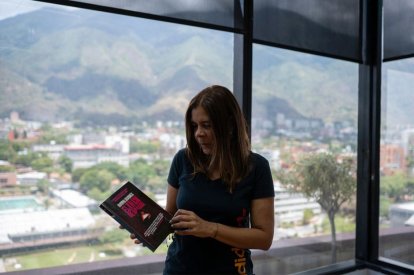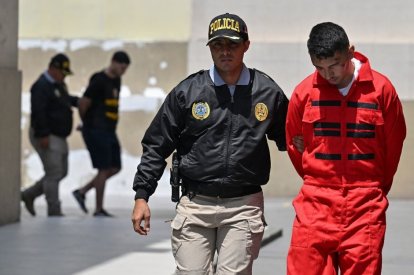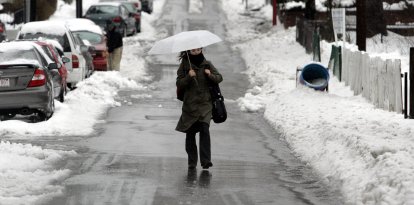Exclusive: Everything you need to know about Tren de Aragua, the fearsome gang that is already operating in the United States
Law enforcement is on alert due to the increase in thieves on motorcycles and their possible link to the dangerous Venezuelan gang.

Voice Media Design.
A wave of cell phone thefts caused by Venezuelan immigrants in New York City has set off all the alarms. The fearsome Tren de Aragua gang, one of the fastest-growing criminal organizations in the world, could be recruiting migrants or extending its tentacles to the streets of the Big Apple to carry out its illicit operations in the United States.
A spokeswoman for the U.S. Immigration and Customs Enforcement (ICE) confirmed to Voz Media in an email that two Venezuelan immigrants detained and charged in the United States for attacking two New York Police officers are members of the gang.
In this report, you will find everything you need to know about Tren de Aragua and its operations in the five boroughs of New York City.
Massive cell phone theft in “The City That Never Sleeps”
According to a series of reports in the New York Post, authorities believe there is a transnational crime operation behind the massive cell phone theft in New York.
According to the New York Police Department (NYPD), there were 160 motorcycle theft patterns between April 2023 and January 2024, a substantial increase compared to 62 between April 2022 and January 2023. Up to 20 crimes can be included in a pattern.
The sub-inspector of the NYPD’s Crimes Against Persons Unit, Nicholas Fiore, told FOX 5 NY that Tren de Aragua gang members operate in a similar way to the members of the Salvadoran gang MS-13, better known as the “Mara Salvatrucha,” responsible for several crimes and murders in New York.
Mainly, the modus operandi of Tren de Aragua in NYC is this: first, its gang members steal cell phones. Then, the bank accounts of those attacked are emptied after being hacked, and fraudulent transactions are made in both the United States and South America. The stolen phones are then sent to Colombia or Venezuela to be erased, reprogrammed, and eventually sold.
According to Fiore, the members of Tren de Aragua entered the United States via the southern border last December. Their main task to achieve rapid expansion was to recruit migrants via WhatsApp, a distinctive characteristic of this gang, according to two security experts consulted by Voz Media.
“Those [WhatsApp messages] go to shelters all over the city,” the agent Fiore explained. “Imagine making a couple of bucks if you’re driving that scooter … If you’re stealing the phones, you could be getting $300 to $600 per cellphone.”
“You can break into one cell phone, and you could empty somebody’s life savings. $10, $15, $20,000,” he added.
According to New York Post sources, Tren de Aragua settled in New York City, making members of its gang enter through the southern border, request asylum and then travel to New York to meet their colleagues. Crimes in NYC, for now, are limited to robbery and theft, with the particularity being that the robberies are carried out on motorcycles that then flee at full speed from the crime scene.
Weeks ago, New York City residents were outraged after an assault against a 62-year-old woman who was dragged along the sidewalk by gang members on a motorcycle went viral. The assailants were of Venezuelan origin.
In two other viral cases, Venezuelan immigrants carried out a shooting in Times Square against a Brazilian tourist and NYPD police officers. In addition, fifteen others also beat up police officers on January 27, which was captured in another video that went viral and generated much indignation throughout the country.
Two of those involved, Wilson Juárez, 21 years old, and Kelvin Servita Arocha, 19, are members of Tren de Aragua, as confirmed to Voz Media by ICE spokesperson Marie Ferguson, who explained that these two migrants were released from custody on Friday morning.
“Yes, the two noncitizens who were in ICE custody and charged in conjunction with the violent gang assault carried out on two NYPD officers were identified as members of Tren de Aragua (TdA) transnational criminal organization,” Ferguson told Voz Media.
“This morning, these individuals were released to the custody of City of New York on writs of habeas corpus ad prosequendum pursuant to New York State Criminal Procedure Law Section 580.30(2),” she said.
When Ferguson was asked how they were able to confirm that Juárez and Arocha are Tren de Aragua members, the spokesperson explained that for “the safety of our officers and the public, U.S. Immigration and Customs Enforcement (ICE) does not comment on law enforcement tactics” or ongoing investigations.
When Voz Media asked about the possible fate of Juárez and Arocha, Ferguson explained that these two immigrants would be deported. Both will receive, in Ferguson’s words, “due process from federal immigration judges in the immigration courts, which are administered by the Executive Office for Immigration Review (EOIR).”
EOIR is an agency within the Department of Justice separate from DHS and ICE.
"Immigration judges in these courts make decisions based on the merits of each individual case. ICE officers carry out the removal decisions made by the federal immigration judges," Ferguson explained.
Another of those involved in the attack against two police officers, Yohandri Brito, was investigated by Voz Media through an internal source of the Police Information System (SIPOL), but no records of the suspect were found in his country of origin. Due to a lack of verified data, the remaining Venezuelans involved in robberies, disruption of public order, or confrontations with the police, which are public knowledge, could not be independently verified in the Venezuelan data system.
As the wave of robberies increases at a rapid pace, the NYPD, which has not yet commented publicly on the gang, hosted a briefing last week where high-ranking officers described a pattern of motorcycle thefts that has the distinctive characteristics of Tren de Aragua.
The circumstances worry both the FBI and the National Guard. In different reports, the New York Post highlighted that the New York State National Guardsmen received orders to review illegal immigrants in search of alleged tattoos related to Tren de Aragua. This situation occurred after the New York police issued a “Situational Awareness Alert” this week warning that the gang of Venezuelan origin is expanding its presence in the five boroughs of the city.
Likewise, the FBI is on alert for a potential alliance between Tren de Aragua and MS-13.
FBI agent John Morales told the New York Post that, although in normal situations these types of gangs would not associate with each other, in this context, there is a possibility that temporary alliances exist for mutual benefit, especially while Tren de Aragua supposedly continues to grow in impact and presence in NYC and other parts of the United States.
"Right now we are working with our local law enforcement partners and sharing intelligence in order to stop the growth of Tren de Aragua," said Morales, who is in charge of the El Paso division in Texas.
Morales explained to the NYPD that the first victims of Tren de Aragua are the Venezuelan immigrants themselves, who suffer extortion in exchange for “protection” to cross the United States border after passing through countries such as Colombia and Mexico.
Gang members in these types of gangs generally pass through border cities, such as El Paso, en route to other parts of the United States, Morales said.
In fact, according to the NYPD itself, Border Patrol agents have already detained 41 alleged Tren de Aragua members along the southern border of the United States between October 2022 and September 2023.
Voz Media contacted the Department of Homeland Security to confirm this information, but there had been no response at the time of publishing this article.
Emails were also sent to the NYPD for more information about the Tren de Aragua expansion in New York, but there was no response either.
Likewise, the FBI is asking Venezuelan migrants to report Tren de Aragua gang members, offering them anonymity through the FBI hotline 1-800-CALL-FBI.
In general, Morales explained, Tren de Aragua also aims to recruit immigrants in vulnerable situations, a method that the gang replicated to extend its tentacles to more than ten countries in the region according to the book “Tren de Aragua. The gang that revolutionized organized crime in Latin America,” written by Venezuelan journalist Ronna Rísquez, who was interviewed for this report.
In that book, Rísquez details the characteristics and origins of the criminal gang, which is notable for its horrific violent crimes against women and its way of recruiting Venezuelan migrants for its criminal activities throughout the region. It also includes the gang’s extensive criminal portfolio, which highlights extortion (the crime originating from Tren de Aragua), kidnapping, human trafficking for sexual exploitation, migrant trafficking, smuggling, illegal mining, drug trafficking, cybercrime and theft.
In addition to New York City, Tren de Aragua has a presence in Miami and Chicago. An alleged member of the gang was recently arrested in Florida following the murder of a retired Venezuelan police officer. So, it is a fact that the tentacles of Tren de Aragua have extended within the United States after expanding to other countries in the region, such as Colombia, Brazil, Chile, and Peru, among others.
The characteristics of Tren de Aragua: rapid adaptation to the environment
On a call with Voz Media, the Venezuelan journalist Ronna Rísquez, one of the best Tren de Aragua experts, explained several of the characteristics of this dangerous gang, including its rapid adaptation to the environment, its negotiation capacity and its versatility to act as a criminal service provider company. Characteristics that allow it to be one of the fastest-growing gangs in the world.
“The group has some very particular characteristics that for me were key in its expansion. He has a great capacity for adaptation, that is, where he reaches, he can perfectly adapt, settle in and join crimes in which he had never ventured," explained Rísquez.
“Then they have a great negotiating capacity, which allows them to achieve alliances, pacts or agreements with local criminal groups to be able to operate in parallel or in alliance,” continued the Venezuelan journalist. “And then, it is a group that can act as a service provider. That is to say, suddenly they are not going to compete with a large drug cartel, but they can provide services to that large cartel in different criminal activities .”
When asked about the infiltration of Tren de Aragua into the streets of New York City and the massive theft of cell phones, Rísquez explained that, with the public information that exists so far, it is still too early to say if the group is really carrying out a mega transnational crime operation. However, she did not rule out that the authorities have enough information that they have not yet shared with the public to determine it.
“I do not see, at least with public information, enough elements to affirm that the Tren de Aragua is in New York. Although perhaps the authorities do have the elements but they are not yet public,” said Rísquez.

Ronna Rísquez, Aragua Train
Venezuelan journalist Ronna Rísquez holding her book about the Tren de Aragua. (AFP stringer)
The journalist explained that, although the theft of cell phones on motorcycles is not a distinctive operation of the Tren de Aragua, the group has no problems in arriving in a city and beginning to operate in a criminal activity that it had never done before. She also said that if the gang is already in New York City, it is very likely that they have made an alliance with another gang thanks to their negotiating power.
“It is not a common operation of the gang, but they adapt to the country where they are, to the characteristics,” said Rísquez. “If this is a Tren de Aragua operation, there must be another gang involved. I don’t think it’s just a Tren [de Aragua] operation. I don’t think they have the capacity to spread that quickly in the U.S. I feel like there’s a lot of speculation at the moment.”
Likewise, the expert assured that tattoos are not a mark to identify members of the Venezuelan gang, even though various national media reports report that authorities are looking for migrants with certain types of tattoos supposedly linked to Tren de Aragua.
“At some point there were stars on the shoulders that were associated with people in prison who were presumed to be linked to some groups. But they were some cases, it is not that if you are members of the Tren de Aragua you should have those tattoos or others. It is not a necessary condition to have a tattoo to be from the Tren de Aragua.”
Is this a Marielitos 2.0 operation?
Last Wednesday, former FBI Deputy Director Chris Swecker made an appearance on Fox News and spoke about Tren de Aragua’s presence in New York City and also about the potential alliance with MS-13.
“We’re in big trouble here. I mean, these are two of the most dangerous gangs on the planet. They are prison-spawn gangs. They come out of the muck and the slime of these South American prisons, which are their stronghold. They are on the lowest rung of the evolutionary ladder when it comes to organized crime. That means they’re all strictly street crime, which is dangerous. They bring with them just mindless knuckle-dragging violence. They kill with knives and machetes,” Swecker said on “America’s Newsroom.”
“MS-13 is well established. They're going to be the more dominant of the two gangs. They've been here for quite a while. And as you say, Dana, we knocked them down in the late 2000s with just an international effort. But now they're coming back in and they're reestablishing themselves. And that bodes ill for law enforcement across the country. We're going to be living with this crime wave for decades. And I believe that Venezuela is emptying their prisons deliberately and sending these people up here, just like Castro did in the 80s."
Swecker’s final reference alludes to the case of “Los Marielitos,” a nickname for Cubans who came to the United States in a mass exodus in the 1980s permitted by the Castro regime.
It is estimated that, of the 125,000 Cubans who sailed from the port of Mariel to Florida, United States, a fifth were criminals or mental hospital patients sent by the Cuban communist regime camouflaged among refugees.
However, proving that Nicolás Maduro’s regime is replicating a “Marielitos 2.0” operation is a complicated mission.
“Although the Maduro regime and the Tren de Aragua have obvious links, it is practically impossible to officially prove that the Venezuelan dictatorship is sending criminals from this organization to the United States,” an Army lieutenant in exile who requested anonymity to preserve the safety of his family, who remains in Venezuela told Voz Media.
“I would not be surprised if Maduro and the Tren de Aragua operate together, since the security forces in Venezuela have done nothing to stop the expansion of this criminal organization, but verifying that Maduro sends them to the United States is something really complex,” the lieutenant commented.
Journalist Ronna Rísquez explained that there is no official evidence linking Tren de Aragua with the Venezuelan regime. Likewise, she stated that she does not believe that there is an operation by the Venezuelan state to send gang members to the United States.
“I do not believe that the Venezuelan Government is supporting the Tren de Aragua so that its members go to the United States,” said Rísquez. “If the members of the Tren de Aragua are going to the U.S., it is not because of a political issue; it is an issue of organized crime. Their leaders send them to commit crimes as they have done in other countries. Colombia, Peru, Ecuador, etc.”

Aragua Train in NYC
A member of Tren de Aragua captured by the Peruvian police. (Cris BOURONCLE / AFP)
However, it is a fact that the Maduro dictatorship has allowed the expansion of Tren de Aragua in Venezuelan territory and, in addition, has benefited from the growth of the criminal group itself, even though the Maduro dictatorship launched a raid last September with 11,000 troops against the Tocorón prison, located two hours west of the capital Caracas, which served as the organization’s operations center.
During that raid, all the privileges that the inmates enjoyed inside the prison were revealed to the public: nightclubs, stores, swimming pools, alcohol, drugs, prostitutes and even a zoo. The prison, like several others in Venezuela, was taken over by Tren de Aragua, and one of the supposed objectives was to capture Hector Rusthenford Guerrero Flores, better known as the “Niño Guerrero,” the leader of the organization, who lived like a king in the most feared detention center in Venezuela.
However, even though the gang had been set up in Tocorón for years, Maduro’s forces took it quickly, and “Niño Guerrero,” although he was one of the main objectives, was not in the prison center. He had fled well in advance through some tunnels that were in the compound, according to regime authorities. His whereabouts, until now, are unknown, according to various press reports. Some speculate that Maduro let him leave the country.
Joseph Humire, executive director of Center for a Free and Safe Society and global security expert specializing in the analysis of transregional threat networks, spoke with Voz Media and analyzed Tren de Aragua in depth: its impact as an organization, why U.S. authorities should be concerned and also its relationship with the Maduro regime.
Mainly, Humire explained that Tren de Aragua is the fastest-growing organization not only in the region but also on the entire planet.
“The Tren de Aragua is the transnational organized crime group that is growing most rapidly in the world. About six years ago they had a presence in two countries, in South America, and currently they have a presence in ten countries throughout the Western Hemisphere, including the United States,” Humire told Voz Media.
“I don’t think I know of any other group that is growing at that level, at that speed, and at the same time taking advantage of the largest migration in the world: the Venezuelan migration. Vulnerable people that they have practically exploited to be able to have a presence in all those countries” continued the expert, who also explained that this voracious growth could not have happened without the support of the Maduro regime. However, there is no official evidence about the links of the Venezuelan government with the gang.
“The rapid growth rate of the Tren de Aragua is very unlikely without the support of some state. We already know that in Venezuela there is a criminalized state, a state whose state institutions are mixed with transnational organized crime, with the cartels of Mexico, with the guerrillas of Colombia, with international mafias, international terrorism and all of this indicates that it is very likely that they are giving some kind of support for the Tren de Aragua to expand so quickly in such a short time,” Humire stated.
The analyst also detailed that the gang managed to destabilize several countries in South America by exploiting massive Venezuelan migration, especially in Chile, Peru, Ecuador and Colombia: a situation that should alarm U.S. authorities.
“These countries saw levels of crime and violence that exceeded what they had on a daily basis. I mean, there are certainly organized crime groups, there are very large groups in those countries, but they have not seen as much robbery, hitmen, kidnapping or human trafficking as they are seeing with the Tren de Aragua at this moment . And in Chile, for example, they dared to attack police officers. That is something that was not very common in Chile,” he explained.
“They were also carrying out cell phone theft operations. So, this is something that puts insecurity at much higher levels than they were previously. And therefore, that would be worrying because the United States already has many insecurity problems in large cities like New York, Chicago, Los Angeles. And if the Tren de Aragua begins, as it seems to be already doing, to penetrate these communities of Venezuelan migrants, the destabilization could be greater.”
Humire told Voz Media that it is very possible that the feared Venezuelan gang is already operating in New York City.
“There have been reports from police in Chicago, in El Paso, in Brownsville, in Miami, detailing that elements of the Tren de Aragua are in their city,” Humire said.
“I think it is very likely that they will be wherever there is a high presence of the Venezuelan community. This is not to try to speak ill of the Venezuelan community, obviously they are victims of the dictatorship in their country, in Venezuela. But like any migrant who is asylum, refugee or displaced, they are vulnerable and the Tren de Aragua takes advantage of this.”
“They are a criminal group that specializes in trafficking people; they specialize in human trafficking. So, they have exploited Venezuelan migration, and therefore, that gives them the ability to have that presence. I think it is very true that they are operating in the United States. I think they are probably operating in more cities than is known and I think it is very likely that they are in New York,” he stated.

























